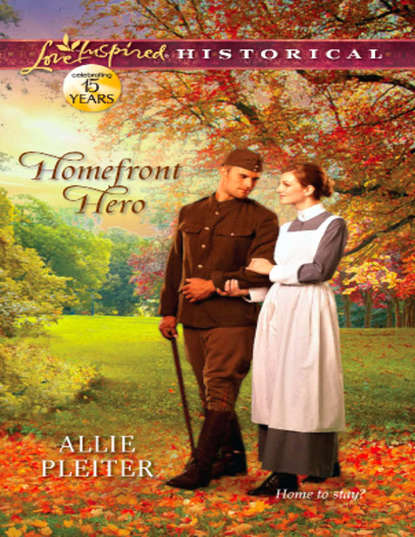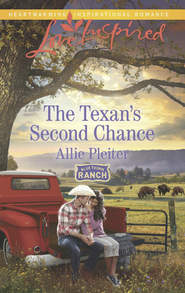По всем вопросам обращайтесь на: info@litportal.ru
(©) 2003-2025.
✖
Homefront Hero
Настройки чтения
Размер шрифта
Высота строк
Поля
The captain tipped his hat. “How fortunate for our boys in the wards. Miss Landway, Miss Sample, I’m delighted to meet you. Tell me what I can say to convince you to come to the rally.”
“Oh, it won’t take much,” Ida cooed.
“We were just on our way over to town early and already planning to attend,” Leanne corrected. “No persuasion will be required.” He certainly seemed a cocky sort, this Captain Gallows.
“I’m not so sure,” he replied with a disarming grin. “I was on campus this morning and one of the students told me she would come, but she would bring her knitting. Not the kind of response I’m used to, I must say. I’m trying to see it as a patriotic act, not an expectation of my inability to fascinate.”
Definitely a cocky sort. “Don’t take that as an affront at all, Captain Gallows. I’m meeting my parents for luncheon and I have my knitting with me right now.”
“Well, I can’t say I haven’t longed for a sharp pointy stick in several conversations with my own father.”
Leanne didn’t find that especially funny. “The Red Cross encourages us to knit everywhere we can, Captain Gallows.” She tried not to glare as she pointed to the bag currently slung over her shoulder. “I assure you, I knit even in church, so the presence of anyone’s yarn and needles need be no dent to your confidence. Our boys need socks as much as the army needs our boys.”
Gallows tucked a hand in his pocket. “Duly noted, ma’am.” He turned to Ida. “Does the Red Cross know what a fine champion they have in nurse Leanne Sample?”
“They ought to,” Ida boasted. “She’s been here a week and already she’s teaching two knitting classes at the hospital.”
“Impressive,” Gallows replied. “I’m sure the fellows here at the hospital have told you there are days when a pair of warm, dry socks are the highlight of the week. I suppose if I just remember that while you all are staring down at your needles instead of up at me, I’ll be just fine.”
The man enjoyed being the center of attention—that much was clear. “You needn’t worry. Most of us can stitch without even looking. I’ve knit so many pairs of socks I think I could probably knit in my sleep by now.”
“Not me,” Ida said. “Leanne’s a good teacher, but I fear for the feet that’ll have to put up with my socks. I’ll have to stare down a fair amount—” she paused and batted her long auburn eyelashes “—but not the whole time.”
“Well, then.” Gallows rocked back on his boot heels. “I have my orders. I’m to be enthralling but not distracting. Have I got it right?”
“I have no doubt you do such a job very well,” Leanne replied, not wanting to give Ida another chance at that one. “Good day, Captain. We’ve a trolley to catch, but we’ll also catch your enthralling-but-not-distracting presentation this evening.”
Gallows tipped his hat. “You do your bit, I’ll do mine.”
Chapter Two
Captain John Gallows planted his feet—or rather one good foot, one bad foot and the tip of his cane—on the porch of the Camp Jackson officers’ hall. He’d envisioned his homecoming so very differently.
Still, he was in South Carolina, if not yet in Charleston. And home, in the form of his formidable and sharp-pointy-stick-worthy father, had come running to him.
“John.” His father pulled open the door before John even set hand to the knob. He gave John a stiff clap on the back. The force made John put more weight on his bad leg than he would have liked. “Our boy, our hero, home for a bit from the grand tour of rousting up recruits, hmm?”
His father undoubtedly considered talking up war a poor substitute for winning one, but John shook off those thoughts as he shook his father’s hand. “You know me,” he said, applying his most charming smile, “ready to open my big mouth for a good cause.”
“Welcome home, dear,” John’s mother cooed as she emerged from the hall behind his father. “Oh, look at that medal.” She smoothed out the front of his uniform and the medal for bravery that continually hung there now. “My son. Decorated for valor.” The pride in her voice was warm and sugary.
John had saved six lives, but only really in his efforts to keep his own. That didn’t feel like bravery. He wasn’t even supposed to be on that navy dirigible except for a favor he was granting to his commander’s buddy. Still, John could spin a rousing tale and history had thrown him into a dramatic scenario. As such, John had been healed up quickly and delivered to several American cities to give speeches. He was eager to return to fighting, but hoped this recruitment tour would better his chances at being admitted to pilot training. Pilots, now those were the real heroes. If doing his best to stir up the patriotic spirit wherever and whenever asked got him closer to that kind of glory, he’d gladly comply.
“How handsome you look,” Mama went on. “How much older than twenty-two. You walk differently, even.”
John winked. “That would be the cane, ma’am,” he joked, swinging it the way Charlie Chaplin did in the movies. He tipped the corner of his hat for effect.
Father made some sort of a gruff sound, but she laughed. “No, that would be the man, son. I’m not talking about your gait, but the way you carry yourself. With wisdom. Authority.”
“Flattery. Don’t you think you’re just a little bit biased?” he teased her.
“Of course I am,” she said, reaching up to lay a hand on each of his shoulders. “Oh, I am just so glad to have you home!” She hugged him tight. “And for so long a leave! Why, I wouldn’t be surprised if they had this nasty business sewn up before y’all even had a chance to get back over there.”
“Now, Deborah,” John’s father replied in his “let’s be sensible” voice, which had the desirable effect of removing Mama’s hands from John’s shoulders, “I hardly think they’d want Johnny back here making all those speeches if the end is near.” His father’s gaze flicked down momentarily to the black cane. “Besides, you’re here to get the best of care while that leg heals.”
“How is it?” Mama asked, following Father’s gaze.
It hurt. All the time. But John had figured out early on that truth wasn’t always the desired answer. “I’ll be fine,” he said, employing his now-stock reply to all such questions. Most days, it was the truth. Yet every moment since the train had pulled into Columbia, he’d felt odd…as if his body suddenly found his home state a foreign land.
Mama tucked her hand in John’s free arm. “To think of my boy, dangling up there over the water, saving lives at the risk of his very own.” Her voice trailed off and she leaned her head against his shoulder.
Saving lives at the risk of his very own. The words came directly from the press wire he’d seen. From the paper they’d read when they’d pinned the medal on him. From the leaflet that papered the cities where he spoke. Funny, all that bravery sounded like it belonged to someone else, even though John had vivid memories to prove otherwise. No man forgets hanging upside down from the stay wires of a dirigible a mile up and a mile out to sea. An army captain, in the air and out to sea. A fluke of circumstance that turned into a near-death disaster. He’d take the memory of nothing but air between himself and his death to his grave, even if he never spoke of it again. He wished he could never speak of it again, never again hear himself be lauded for an act that had no selfless heroism to it at all. It wasn’t admirable to go to drastic lengths to save an airship when the alternative was crashing into the ocean with it.
“A heroic tale, surely,” Papa boasted. “I imagine the ladies think even more highly of you now.”
Father was right in that respect. The only thing ladies liked more than a man in uniform was a decorated hero in uniform. And John—like every member of the well-bred Gallows family—was a social success even before he slipped into uniform. He’d not lacked for company for one minute of his hospital stay, the voyage home, or his multi-city speaking circuit. “Well, now,” he quipped, “hard to say. The nurses are supposed to be attentive. It’s their job.”
“I have the feeling ‘above and beyond the call of duty’ has a new meaning.” Oscar Gallows laughed. He’d been a dashing soldier in his own day, Mama always said. “Seems to me y’all won’t hurt for company one bit.”
“Do you have to stay at the camp?” Mama asked…again. “Why can’t you come home to Charleston? You’d be so much more comfortable at home with us.”
“The hospital reconstruction therapists are here, Mother. And I am still on active duty. I’ve got to go where they send me.”
Mama pouted. “Tell them to send you home to your mama’s good care.”
“That’s no way for a Gallows to serve, Deborah. John has duties to perform even while he heals. You wouldn’t want him to finish up the war as a mere spokesman, would you?”
Oscar Gallows began strutting toward the general’s house where they had a luncheon engagement before John’s big speech tonight. His father walked quickly, giving no quarter to John’s injured leg.
John wasn’t surprised. A Gallows gave no quarter to anyone, least of all himself.
* * *
“It’s so dry here.” Leanne watched her mama mop her brow and frown over her glass of tea. “And dreadfully hot without any kind of breeze. I don’t know how you don’t just shrivel up.”
In truth, Columbia was a lovely town. It held the University of South Carolina and the state capitol—both as fine cultural centers for the region as any of which Charleston could boast. While it lacked the sea breeze, it also lacked the rain-soaked humidity that sent Charlestonians running out of their city to their beach houses. “I’m half a day to the coast, Mama. And no, I won’t shrivel up. For goodness’ sakes, I’m a nurse… I imagine I’ve learned how to care for myself in the process.”
“That place is just massive,” Mama moaned, casting her glance across town in the direction of Camp Jackson. Mama had made it clear, over and over and despite Leanne’s many statements to the contrary, that she had fully expected Leanne to return to Charleston after completing her courses at the university, not join the service as she had done. “And so drab.” Mama put a dramatic hand to her chest. “What if they decide to send you overseas?”
“They won’t send me overseas, Mama. I’m needed here. Can’t you see what an opportunity this is?”
Papa, who had been rather quiet the entire trip, put a hand on Mama’s shoulder. “She needs to do her part, and far better here than over there. She’ll learn a great deal.” Leanne had the distinct impression he was half lecturing himself. “Honestly, Maureen, Columbia is not that far from Charleston.”
“Not far at all, Papa,” Leanne assured him. “And I’ll be able to feel so much more useful here.” She’d learned a great many things already, and was about to learn a great deal more. The world was changing so fast for women these days—there was talk of voting and owning property and pursuing careers in literature and painting, serving overseas, all kinds of things. Awful as it was, the war gave women the chance to do things they’d never done before. The lines of tradition were bending in new and exciting ways, and if they would only bend for this time, she couldn’t bear to miss exploring all she could in a town that was right at the heart of it all.
Leanne yearned to know she’d made a difference—in lives and in the healing of souls and bodies. She felt as if she would make too small a contribution in Charleston now that the university had shown her how far a life’s reach could be. Leanne wanted God to cast her life’s reach far and wide.
As they finished their luncheon and walked reluctantly to the train station, Mama smoothed out Leanne’s collar one last time.











